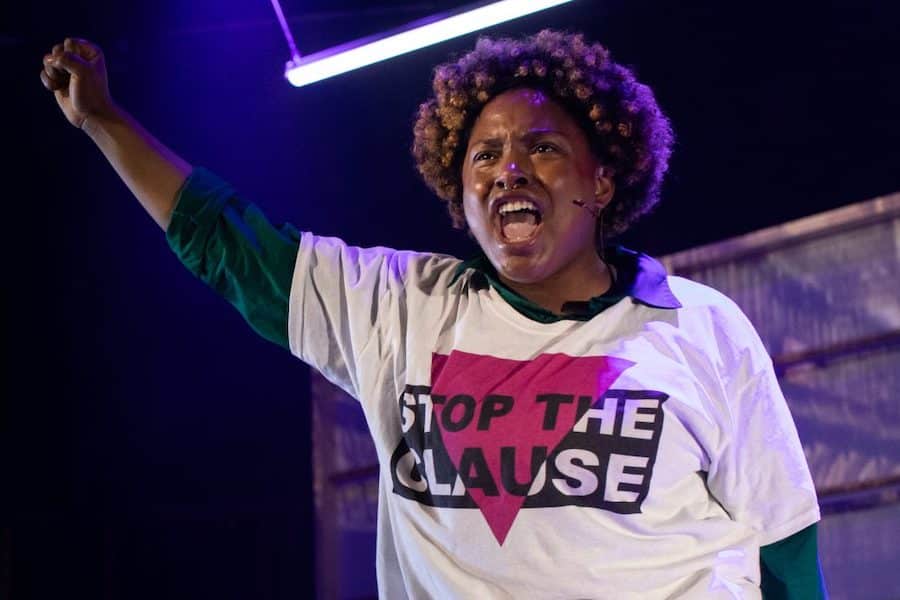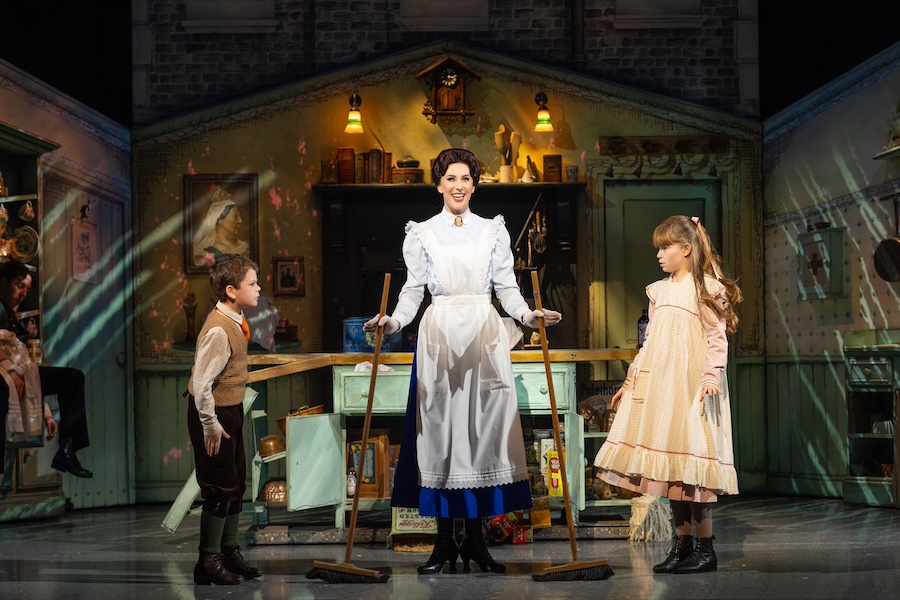Review: After the Act at HOME is ‘a devastating exploration of the chilling effects of Section 28’
- Written by Connor Cooper
- Last updated 5 months ago
- City of Manchester, Featured, Theatre

Section 28 or Clause 28 as it was known at the time was a law introduced in 1988 by the Conservative government that banned councils and schools from “promoting the teaching of the acceptability of homosexuality as a pretended family relationship.”
Opening on the fateful day that lesbian activists commandeered a BBC News broadcast to protest against Section 28, After the Act chronicles the culture of homophobia that preceded it, as well as the laws harmful legacy.
With every line of dialogue taken from the real testimonies of activists, students, teachers and politicians who lived through Section 28; After the Act paints a unique portrait of a bygone Britain that is equal parts heartbreaking and life affirming.
After the Act at HOME

With a cast of just four people, yet numerous stories to tell, After the Act is a very ambitious production. The quartet each manage to traverse the various emotions needed to tell such a sensitive story.
Donning such caps as Sue Lawley and Margaret Thatcher, Ellice Stephens is a versatile performer. She generates many of the biggest laughs throughout the show, as well as being a co writer!
Although seeing the Iron Lady grinding against a podium is certainly memorable, Ellice’s most moving performance is as the closeted PE teacher Catherine who struggles with the pressure of essentially leading a double life at work. She displays a sensitivity and tenderness that is very moving. You cannot stop your heart going out to her as she recounts how it felt to begin her teaching career right as the Section 28 came into effect.
Activist Nkara Stephenson
Nkara Stephenson is first introduced to the audience as one of the lesbian activists who invaded the 6 o’clock news. They are a commanding yet personable presence on stage, just as convincing in this role as they are as a concerned mother, convinced lesbians are trying to recruit her young daughter. He is confident, compelling and very impressive on stage, managing to perform what is essentially a patter song while frantically skipping on the spot.
When portraying a closeted teen, growing up surrounded by shame due to religious abuse; Nkara manages to tap into that all too real anxiety that comes with realising your identity for the first time. You cannot help but root for him and he takes tentative steps towards selfhood.
Ericka Posadas is a valuable asset to the cast who, like everyone, is great at in a supporting role and as a focal point. They are frightfully convincing as the type of hateful teenage girl that seems to thrive in a PE changing room. It is as Maya, the much harassed member of the pioneering Lesbian and Gay Unit of Haringay Council, that Ericka’s talents are most on display. The audience can feel their building frustration and sense of helplessness as she and their colleagues are dragged into the hysterical moral panic that began with a danish children’s book about a little girl with two dads, and ended with it being illegal to talk to children about being gay.
Zachary Willis’ excellent performance
Whether he is wrestling a protester to the ground in a BBC studio or pointing a gun at his son as a homophobic priest, Zachary Willis is an extremely watchable performer who has an enviable command of the stage.
Like his cast mates, Willis portrays numerous different people with different perspectives with ease. His most touching performance is as Ian, a man who attended an all boys grammar school during Section 28 and subsequently struggled with poor mental health due to the homophobic abuse he endured. Willis is real and raw in this, and every, performance.
He holds the audiences attention and easily switches between giddily recalling the shambles of sex education lessons and whipping fellow parents up into a frenzy over a children’s book.
Sleek set design by Bethany Wells
The set, designed by Bethany Wells, is comprised entirely of equipment reminiscent of a school gym. With a folded away apparatus providing the backdrop and benches and colourful agility tables serving as everything else. This is a really clever choice because these objects provide a versatile set that feels nostalgic but also reinforces one of the key messages of the show: LGBT school children who grew up around the time of Section 28 were among the ones most severely affected.
Jodie Underwood’s lighting is effective and polished, assisting the story’s more emotional moments and adding another layer to the experience.
The costumes are all cohesive, whether it’s power suits and ties with a bright colour scheme that invoke the period in the first act or the more subdued PE kit adjacent outfits of the second half.
After The Act features choreography by Sum-Im Her. There is an impressive range of distinctive dances throughout, from the deliberate, angular movements of voguing, to the more modern, flowing steps that are associated with modern dance. It really serves the story and the cast perform it with impressive synchronicity.
The first half of After the Act focuses on the events that lead up to Section 28 being implemented, as well as the activism it sparked. Rather than one narrative, there are several talking head like segments from various people that help to convey the general culture of homophobia at the time. Although this provides a meaningful amount of historical context, it does feel a little dense at times.
The second act begins in the 1990’s and focuses on the detrimental after effects of the law, culminating in the historic protest march against Section 28 in Manchester. This half feels more cohesive because there are two or three stories being told, as opposed to six or seven.
Using mixed media throughout the show
Mixed media is used throughout After the Act, (video design by Zakk Hein) with the time periods, headlines and other relevant information displayed throughout. Rather than being projected onto a blank wall, they are projected onto folded away gym apparatus.
Perhaps the most impressive element of After the Act is that all the music is composed and orchestrated by one person. Frew. He expertly switches between instruments and seems completely in control at all times.
Because the all of the dialogue is pulled verbatim from actual speeches, much of the music in After the Act is less songs, and more spoken word- especially in the first act.
After The Act is a rousing and impactful look at an extremely significant time in history. It is very valuable whether you survived the horrors of Section 28 and its brutal aftermath, or you are learning about it for the first time. It is a bold and interesting look at this all too recent time in history.
Tickets for After the Act at Home
After The Act is at HOME until Saturday 16th November 2024, tickets are available here
- This article was last updated 5 months ago.
- It was first published on 14 November 2024 and is subject to be updated from time to time. Please refresh or return to see the latest version.
Did we miss something? Let us know: press@ilovemanchester.com
Want to be the first to receive all the latest news stories, what’s on and events from the heart of Manchester? Sign up here.
Manchester is a successful city, but many people suffer. I Love Manchester helps raise awareness and funds to help improve the lives and prospects of people across Greater Manchester – and we can’t do it without your help. So please support us with what you can so we can continue to spread the love. Thank you in advance!
An email you’ll love. Subscribe to our newsletter to get the latest news stories delivered direct to your inbox.
Got a story worth sharing?
What’s the story? We are all ears when it comes to positive news and inspiring stories. You can send story ideas to press@ilovemanchester.com
While we can’t guarantee to publish everything, we will always consider any enquiry or idea that promotes:
- Independent new openings
- Human interest
- Not-for-profit organisations
- Community Interest Companies (CiCs) and projects
- Charities and charitable initiatives
- Affordability and offers saving people over 20%
For anything else, don’t hesitate to get in touch with us about advertorials (from £350+VAT) and advertising opportunities: advertise@ilovemanchester.com

RNCM strikes major partnerships to power next generation of Manchester musicians

Failsworth’s funniest export wants your laughs (and some new parquet flooring)

Meet the Salford creators changing the face of digital storytelling


Irresistible tapas spots in Manchester that’ll make you feel like you’re in Spain














